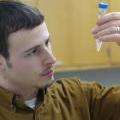Scott Nixon

Degree: Ph. D.
Project: Immunological stress, as with all stressors, comes with a physiological cost to the organism. The immune system response to such inputs can have both acute and long-term effects upon the behavioral actions of the animal. The biological cost associated with these stress responses can be framed in terms of health, as well as affecting the growth and fitness of animals used for food and fiber. The goal of my research is to integrate phenotypic and individual RNA sequencing information to understand the molecular mechanisms associated with immunological stress using systems biology approaches. To accomplish this goal, I am using state-of-the-art technologies including high-throughput RNA-sequencing and flow cytometry, together with computational and statistical genomic tools to elucidate the routes from perceived stress to physical and behavioral response.
Daniel Febrer

Dianelys González-Peña

Degree: Ph. D.
Project: In livestock species, reproductive technologies can intensify the dissemination of top genetics, reduce animal maintenance costs, enable genetics banking, and facilitate biosecurity. I am studying the impact of artificial insemination techniques and semen preparation practices on the genetic improvement and financial profit of U. S. production systems using deterministic simulation. Additional areas of research are genetic parameters of production, reproduction and health traits in livestock species.
Kristin Delfino

Degree: Ph. D.
Project: Identification of genes and pathways biomarkers of complex health and behavior traits is necessary for canidate gene studies and effective diagnostic tools and therapies. My research focuses on the characterization of microRNA, transcription factor and target gene networks associated with disease survival and recurrence.
M. Nadeem Malik

Project: Neuropeptides, a class of cell-cell signaling peptides are associated with a wide variety of traits of agricultural importance including growth and development, feeding, stress, memory cancer, reproductive health, drug metabolism, wound healing, and cardiovascular disease. Neuropeptides are challenging to identify due to the typically short length and the challenges are even higher in livestock species with limited empirical confirmation. I am working on the evaluation of database search programs for accurate detection of neuropeptides in tandem mass spectrometry experiments.
Zeeshan Fazal

Degree: Ph. D.
Project: Proteomics mass spectrometry experiments are becoming more commonly used in livestock and crop species. The goal of my research has been to identify the peptide structural factors associated with ion fragment intensities. Understanding these factors is critical for the successful identification of proteins associated with production and health.
Luciano Pinheiro da Silva

Degree: Ph. D.
Project: The domestic quail is an accepted model to study the genetic parameters of growth and reproduction in domestic poultry due to the similar traits, low maintenance cost, and low generation interval. My research focuses on evaluating alternative models to describe production and reproduction traits and quantify the heritability and genetic correlation among these traits. The results of my studies will help in the development and implementation of genetic selection practices that maximize the improvement of desirable traits while maintaining or controlling less favorable traits.
Brad Daigneault

Degree: Ph. D.
Project: My research is focused on improving livestock production through the use of novel bioassays and molecular biology. I am particularly interested in identifying sperm characteristics that are related to fertilization and developmental potential. Statistical models that employ multiple measures of sperm are often useful for estimating male fertility. I am subjecting frozen-thawed boar sperm to oviduct binding, zona binding and in vitro fertilization assays to develop a multivariate regression model that will be predictive of boar fertility. We have also collected artificial insemination data and sperm motility and membrane characteristic measures. My assays generate many data points that require integration of different types of information. I am also investigating the contribution of sperm microRNA to fertilization and development. Identification of microRNA in boar sperm involves mining large databases and using bioinformatics to discover microRNAs that are related to spermatogenesis and sperm function. A systems biology approach to identify characteristics of sperm that are related to fertility could improve both the quantity and quality of livestock production. My overall goal is to investigate molecular aspects of gamete interactions and translate these findings to direct and meaningful industry application.
Muhammad Jawad Khan

Degree: Ph. D.
Project: The transition period in dairy cows is very critical to sustain cow’s health and for maximum milk production. Advanced nutritional strategies can help to reduce metabolic problems and complications associated to it. So, my research is focused on molecular adaptations in liver of dairy cows in response to nutrition around the time of calving. I have performed microarray and qPCR analysis as well as in-depth bioinformatics analysis of microarray data. An important aim of the research is to integrate whole animal level data (e.g. blood metabolites, performance, liver tissue composition) with mRNA expression to build a systems-biology knowledge base of the transition period in dairy cattle. In addition, I am also working on a project to establish a tool to visualize gene expression data generated via high-throughput techniques.
Caroline González Vega

Degree: Ph. D.
Project: I am interested in understanding calcium digestibility, metabolism, and requirements. Calcium influences not only the digestibility of phosphorus but also the utilization of phosphorus in pigs, and phosphorus is not only the third ingredient most expensive in swine diets but it has also environmental concerns. Therefore, it is important to understand the relationship that has calcium and phosphorus and other factors that influences the digestibility of both minerals. I use advanced multivariate models to understand the inter-relationship between all these variables.

